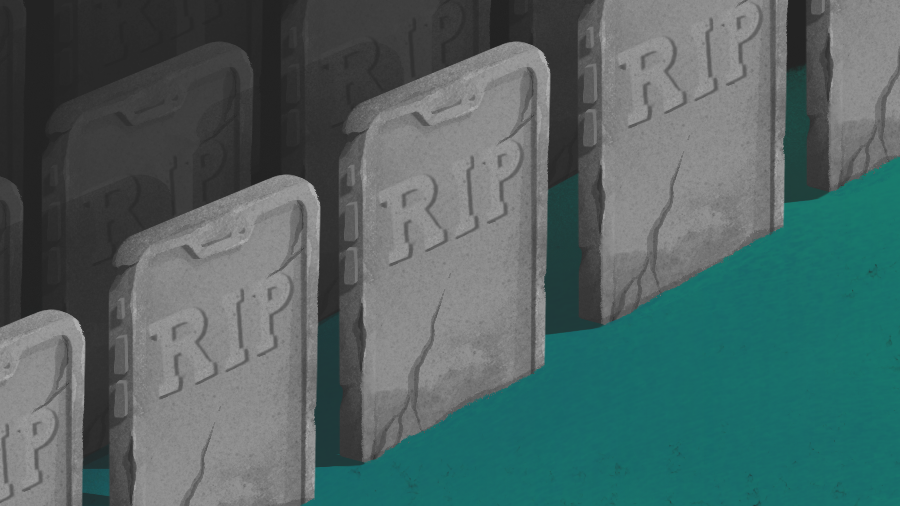Life has gotten ever more dominated by digital technology. Now it seems it’s only a matter of time until death gets that way too.
Subscribe to the Crunchbase Daily
From software for writing wills to e-commerce upstarts creating memorial objects from cremated ashes, startups across the globe have been scaling up offerings aimed at end-of-life planning and at memorializing the departed.
Investors have been active as well. Over the past three years, venture and seed backers have put capital into at least 26 companies offering products and services around death and bereavement, per an analysis of Crunchbase data.
We’ve compiled a list of startups here. Some of the more heavily funded include Everdays, an app for contacting and connecting with people following a loss, Farewill, a platform for will-writing and probate, and Eterneva, a seller of diamonds made from cremated ashes.
Broad societal shifts
The investments come amid a series of broad societal shifts around end-of-life planning, burials and memorial services.
In the U.S., probably the biggest long-term shift is a growing preference for cremation over burial in a cemetery. In 2020, roughly 56 percent of those who died had their remains cremated, according to the National Funeral Directors Association (NFDA). By 2040, the association predicts, the U.S. cremation rate will reach more than 78 percent, a trend it attributes to changing consumer preferences, weakening religious prohibitions, cost considerations, and environmental concerns.
The rise in cremation also constitutes a change in the type of service, if any, that families want, said Randy Anderson, NFDA president-elect. While burial services take place shortly after death, memorials for those who are cremated are often scheduled days, weeks, or months later. Commonly, there is no service at all.
In the short term, COVID-19 has also disrupted funerals and memorials. Services, to the extent they happen, are mostly held outdoors with attendance limited to close family. While that shift may end post-pandemic, another COVID-19 inspired trend—the online memorial—is likely to persist. Anderson predicts that even when larger gatherings are back, families will still want online streaming of services for those far away or otherwise unable to attend in person.
What do shifts mean for startups?
Considering the sums spent on end-of-life planning and memorials, venture capital investment in related startups looks rather paltry. Companies on our funded startup list collectively raised about $117 million to date. That’s less than what a single round for a hot unicorn company might fetch these days.
It bears mentioning that looking at funded startups creates a limited picture. A large portion of the companies selling keepsakes derived from cremated ashes and other posthumous offerings online, for instance, do not appear to be venture- or seed-funded.
This includes makers of ash-containing tattoos and inks, memorial jewelry, portraits and glass figurines. There’s even a British company, And vinyly, that presses ashes into a vinyl record and promotes itself with the tagline: “Live on from beyond the groove.”
However, if the revenue potential looks high enough, venture investors have shown interest in the cremated ash aftermarket. Austin-based Eterneva, which sells ash-derived diamonds at a starting price of $3,000, has raised around $5 million in known funding, including a recent $3 million round. Founders reeled in a portion of that total from billionaire Mark Cuban following a successful stint on the show “Shark Tank.”
Beyond Eterneva, investors seem to favor internet and software startups that simplify commonly cumbersome processes.
Some are consumer-focused. Michigan-based Everdays, for instance, has raised $17 million for a social media platform that lets people mourning loved ones share invitations, video tributes, photos and messages in a single place.
Others are focused on industry verticals. This includes PlotBox, a cloud software platform for cemetery operators that claims to drastically reduce time spent on routine record-keeping.
Environmentally friendly alternatives to burial are also getting investors’ attention. One example is Seattle-based Recompose, which uses a process called natural organic reduction to transform human remains into soil. Another is Better Place Forests, a San Francisco startup that maintains a memorial forest in which the ashes of the departed can rest beneath a private tree.
More to come?
It’s not hard to envision a larger flow of venture dollars to businesses focused on memorializing the departed and on end-of-life planning.
Certainly, there’s a vast pool of family members and service providers seeking tools to carry out often unpleasant tasks more easily and effectively. Pre-pandemic, more than 2.8 million Americans passed away annually in recent years. Globally, more than 50 million die each year.
Startups serving grieving families may do better emphasizing quality of product and experience over cost. Anderson said that while cost may be a consideration, it’s not the major factor driving decisions around memorials or choosing cremation over burial. Rather, grieving families are looking for ways to boost connection in times of loss and to find personally meaningful ways to memorialize loved ones—potentially through memorial objects, ceremonies or, increasingly, an online gathering.
As for the role technology should play, Anderson advises those targeting the funeral industry to remember it is a tradition-bound sector with longstanding businesses that adapt to change rather slowly. That favors innovators with offerings that are easier to adopt and implement, rather than technologies with a steep learning curve.
Illustration: Dom Guzman

Stay up to date with recent funding rounds, acquisitions, and more with the Crunchbase Daily.





![Illustration of "clicking" on an AI brain {Dom Guzman]](https://news.crunchbase.com/wp-content/uploads/AI_Brain-470x352.jpg)
![Illustration of a guy watering plants with a blocked hose - Global [Dom Guzman]](https://news.crunchbase.com/wp-content/uploads/quarterly-global-3-300x168.jpg)
67.1K Followers